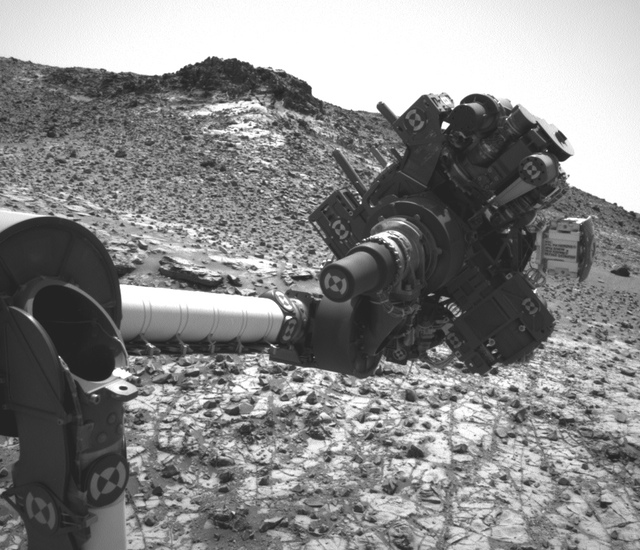Concept drawing of Curiosity. Image: NASA/JPL-Caltech.
On Tuesday NASA revealed that the robotic arm of the Mars Curiosity rover experienced a short circuit on February 27, and announced a cessation of all drilling and driving operations. After days of troubleshooting, it seems the Curiosity team has finally isolated the problem. Fortunately, the outlook for the rover—which is by far the most advanced laboratory on Mars—is looking good."Diagnostic testing this week has been productive in narrowing the possible sources of the transient short circuit," said Jim Erickson, Curiosity's project manager, in a NASA statement released yesterday."The most likely cause is an intermittent short in the percussion mechanism of the drill," he continued. "After further analysis to confirm that diagnosis, we will be analyzing how to adjust for that in future drilling." The drill's percussion mechanism allows it to hammer deeper into the Martian surface while collecting samples. It is also useful for transferring samples of rock-powder into the appropriate receptacle onboard Curiosity, and it was while performing this second task that the current fluctuated and shorted the rover's arm.Engineers with NASA's Jet Propulsion Laboratorynoted that a similar short occurred again on Curiosity on Thursday, while they were testing the same percussion motion. They plan to experiment with different orientations of the arm to avoid future malfunctions, and expect the rover to continue drilling and driving further up Mount Sharp as early as next week.That's great news, because Curiosity's drilling ability has produced many discoveries over the course of its mission, including proof that Mars once had the ingredients necessary to sustain life. It would have been a huge disappointment if the rover was unable to probe for new samples, especially since it is currently ascending a geologically fascinating mountain in the middle of an ancient lakebed.After all, losing spacecraft over minor errors is hardly unprecedented, as the teams behind the British Mars rover Beagle 2 or Rosetta's dormant Philae comet lander can attest. Traversing alien worlds puts enormous stress on our robotic explorers, and malfunctions are to be expected (indeed, the short is only the latest of Curiosity's hiccups).That said, Curiosity still has a lot of traveling to do, and a lot of samples to collect. After a few days of suspense, it seems NASA is finally confident enough to declare it up to the job.
The drill's percussion mechanism allows it to hammer deeper into the Martian surface while collecting samples. It is also useful for transferring samples of rock-powder into the appropriate receptacle onboard Curiosity, and it was while performing this second task that the current fluctuated and shorted the rover's arm.Engineers with NASA's Jet Propulsion Laboratorynoted that a similar short occurred again on Curiosity on Thursday, while they were testing the same percussion motion. They plan to experiment with different orientations of the arm to avoid future malfunctions, and expect the rover to continue drilling and driving further up Mount Sharp as early as next week.That's great news, because Curiosity's drilling ability has produced many discoveries over the course of its mission, including proof that Mars once had the ingredients necessary to sustain life. It would have been a huge disappointment if the rover was unable to probe for new samples, especially since it is currently ascending a geologically fascinating mountain in the middle of an ancient lakebed.After all, losing spacecraft over minor errors is hardly unprecedented, as the teams behind the British Mars rover Beagle 2 or Rosetta's dormant Philae comet lander can attest. Traversing alien worlds puts enormous stress on our robotic explorers, and malfunctions are to be expected (indeed, the short is only the latest of Curiosity's hiccups).That said, Curiosity still has a lot of traveling to do, and a lot of samples to collect. After a few days of suspense, it seems NASA is finally confident enough to declare it up to the job.
Advertisement
